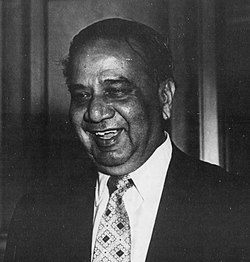Central Government of Huseyn Shaheed Suhrawardy | |
|---|---|
| 6th Cabinet of Pakistan | |
| 1956-1957 | |
 Prime Minister Suhrawardy on the leftmost, alongside his President, Iskander Mirza at the rightmost, in a government office. | |
| Date formed | 12 September 1956 |
| Date dissolved | 17 October 1957 |
| People and organisations | |
| Head of state | Iskander Mirza |
| Head of government | Huseyn Shaheed Suhrawardy |
| Member party | AL Coalition members: RP |
| Opposition party | PML UF |
| Opposition leader | I.I. Chundrigar |
| History | |
| Election | 1955 Pakistani Constituent Assembly election |
| Outgoing election | 1947 Pakistani Constituent Assembly election |
| Legislature terms | 2nd Constituent Assembly of Pakistan |
| Predecessor | Chaudhri Muhammad Ali government |
| Successor | Chundrigar government |
The Suhrawardy government also called the Suhrawardy administration was the sixth government and cabinet of Pakistan which was formed by Huseyn Shaheed Suhrawardy on 12 September 1956 after the resignation of Chaudhry Muhammad Ali. [1]
Contents
The government was dominated by Bengali politicians from East Pakistan and members of the ruling All-Pakistan Awami League. The Awami League joined a coalition with the Republican Party to form the government. Growing animosity between West and East Pakistan as well as between Suhrawardy’s coalition partners and his own party members led to Suhrawardy’s resignation and succession by the Chundrigar government in October 1957.

